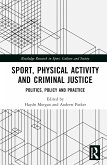This is the first book to explore fully the connections between sport studies and criminology, opening up critical new frontiers in the study of sport and crime.
Rooted firmly in established critical criminological traditions, the book also employs insights from emerging theoretical frameworks such as cultural criminology, governmentality theory and critical security studies to make better sense of a range of transnational and contemporary cases, events and trends that reveal, in different ways, the crimes and harms that are present in sport. Empirically grounded, including case studies of the 2022 World Cup in Qatar and the Tokyo 2020 Olympic Games, it explores emerging themes in contemporary sport, including but not limited to corruption, doping, youth crime, terrorism, violence and transgression, and human rights abuses. Sport and Crime consciously pushes the boundaries of what might be considered the critical criminology of sport.
This is an essential text for any course on sport and crime, and invaluable reading for any student or researcher with an interest in the sociology of sport, sport development, sport policy, the politics of sport, critical criminology, or socio-legal studies.
Rooted firmly in established critical criminological traditions, the book also employs insights from emerging theoretical frameworks such as cultural criminology, governmentality theory and critical security studies to make better sense of a range of transnational and contemporary cases, events and trends that reveal, in different ways, the crimes and harms that are present in sport. Empirically grounded, including case studies of the 2022 World Cup in Qatar and the Tokyo 2020 Olympic Games, it explores emerging themes in contemporary sport, including but not limited to corruption, doping, youth crime, terrorism, violence and transgression, and human rights abuses. Sport and Crime consciously pushes the boundaries of what might be considered the critical criminology of sport.
This is an essential text for any course on sport and crime, and invaluable reading for any student or researcher with an interest in the sociology of sport, sport development, sport policy, the politics of sport, critical criminology, or socio-legal studies.








